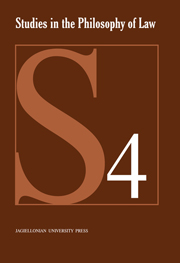Book contents
- Frontmatter
- Contents
- Preface
- Six Causes of the Dispute over Legal Bioethics
- Bioethics and Legal Philosophy
- The Outline of the Subject of Biojurisprudence
- Law and Biotechnology
- The Ethical Significance of Evolution
- Human Nature after Darwin
- The Notion of the Person in Bioethical Debates
- The Roots of Normativity. From Neuroscience to Legal Theory
- Why No One Should Ever Win the Nobel Prize: Neurolaw, Reward and Punishment
- Is There Anybody Who Really Wants to Live Forever? The Significance of Mortality
- The Slippery Slope Arguments Against the Legalization of Physician-Assisted Suicide
- Ethical Problems of Hematopoietic Stem Cells Transplantation
- Notes about the Authors
The Roots of Normativity. From Neuroscience to Legal Theory
Published online by Cambridge University Press: 05 September 2014
- Frontmatter
- Contents
- Preface
- Six Causes of the Dispute over Legal Bioethics
- Bioethics and Legal Philosophy
- The Outline of the Subject of Biojurisprudence
- Law and Biotechnology
- The Ethical Significance of Evolution
- Human Nature after Darwin
- The Notion of the Person in Bioethical Debates
- The Roots of Normativity. From Neuroscience to Legal Theory
- Why No One Should Ever Win the Nobel Prize: Neurolaw, Reward and Punishment
- Is There Anybody Who Really Wants to Live Forever? The Significance of Mortality
- The Slippery Slope Arguments Against the Legalization of Physician-Assisted Suicide
- Ethical Problems of Hematopoietic Stem Cells Transplantation
- Notes about the Authors
Summary
Towards a unified worldview
One of the most famous sentences in the history of moral philosophy was expressed by Immanuel Kant in the closing chapter of his Critique of Pure Reason. “Two things fill the heart with renewed and increasing awe and reverence the more often and the more steadily that they are meditated on: the starry skies above me and the moral law inside me.” The two centuries that have passed since Kant wrote these words have brought enormous progress in our knowledge about almost all aspects of the “starry skies.” To understand the breakthrough that took place between the time of Kant and our own it is enough just to mention that almost half century after Kant, another philosopher – August Comte, one of the greatest enthusiasts of science ever, – argued with certainty that it would never be possible to uncover the chemical composition of stars due to their incredible distance from us, making them permanently unreachable for any scientific examination. Several decades after Comte we have figured out not only their exact chemical composition but also the internal processes taking place in each successive stage of their long existence. Furthermore, we have managed to capture the general frame of cosmic evolution that led to the emergence of those starry skies that delighted Kant in his time and have not ceased delighting us to this day.
- Type
- Chapter
- Information
- Studies in the Philosophy of LawLegal Philosophy and the Challenger of Biosciences, pp. 97 - 122Publisher: Jagiellonian University PressPrint publication year: 2010



